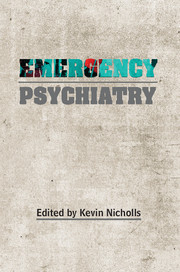Book contents
- Frontmatter
- Contents
- List of contributors
- Acknowledgements
- Preface
- 1 Assessment of suicide risk
- 2 Violence and aggression
- 3 Substance misuse emergencies
- 4 Alcohol and psychiatric emergencies
- 5 Acute psychosis
- 6 Acute side-effects of psychotropic medication
- 7 Emergencies in child and adolescent psychiatry
- 8 The psychiatric intensive care unit
- 9 Safeguarding
- 10 Emergency electroconvulsive therapy
- 11 Life-threatening medical emergencies in a mental health unit
- 12 Emergencies in intellectual disability psychiatry
- 13 Emergencies in older persons’ psychiatry
- 14 Perinatal psychiatric emergencies
- 15 Civilian and military psychological trauma
- 16 Emergencies in liaison psychiatry
- 17 Psychiatric emergencies in deaf people
- 18 Mental health law
- 19 Self-poisoning: aspects of assessment and initial care
- Index
18 - Mental health law
Published online by Cambridge University Press: 01 January 2018
- Frontmatter
- Contents
- List of contributors
- Acknowledgements
- Preface
- 1 Assessment of suicide risk
- 2 Violence and aggression
- 3 Substance misuse emergencies
- 4 Alcohol and psychiatric emergencies
- 5 Acute psychosis
- 6 Acute side-effects of psychotropic medication
- 7 Emergencies in child and adolescent psychiatry
- 8 The psychiatric intensive care unit
- 9 Safeguarding
- 10 Emergency electroconvulsive therapy
- 11 Life-threatening medical emergencies in a mental health unit
- 12 Emergencies in intellectual disability psychiatry
- 13 Emergencies in older persons’ psychiatry
- 14 Perinatal psychiatric emergencies
- 15 Civilian and military psychological trauma
- 16 Emergencies in liaison psychiatry
- 17 Psychiatric emergencies in deaf people
- 18 Mental health law
- 19 Self-poisoning: aspects of assessment and initial care
- Index
Summary
Legislation pertaining to the care and treatment of individuals presenting with mental disorders is constantly evolving. Legal provision can be traced back to the Madhouses Act of 1774 but, until 1845, the law was mainly concerned with the licensing and inspection of madhouses and asylums. In 1845, the Lunacy Commission was established, with jurisdiction over the detention and treatment of persons of unsound mind throughout England and Wales. This year also saw the requirement to establish county asylums throughout the two countries, via the Lunatics Asylums Act 1845. The Idiots Act 1886 further permitted local authorities to build special asylums for ‘idiots’ or ‘mental defectives’. The Lunacy (Consolidation) Act 1890 allowed for four methods of admission to an asylum, all of which required certification; this Act was somewhat updated by the Mental Deficiency Act 1913, which defined four grades of mental deficiency (idiots, imbeciles, feeble-minded persons and moral defectives) and the Mental Treatment Act 1930, which for the first time made provision for the voluntary admission of individuals who were able to make a written application and be received as a patient without a reception order. The Lunacy (Consolidation) Act 1890 was not repealed until 1959.
The Mental Health Act 1959 (the 1959 Act) brought major changes to the rules surrounding the assessment, detention, care and treatment of those deemed to be suffering from mental disorders and mental deficiency, repealing all previous legislation in this regard. Building on advances in psychiatric treatment, the 1959 Act introduced the concept that mental health patients should be treated no differently to other patients. Patients could be cared for in the community if hospital treatment was not required, and if it was, this did not need to be under compulsion unless treatment was deemed urgently necessary and the person refused to accept informal admission and their clinician's advice with regard to treatment. It was intended that most patients would be admitted informally, and this represented a major shift in focus from ‘asylum’ for patients to care, treatment and individual rights. The 1959 Act introduced a definition of mental disorder: ‘mental illness, arrested or incomplete development of mind, psychopathic disorder, and any other disorder or disability of mind’. Mental Health Review Tribunals were also introduced to review cases of compulsory detention when requested by patients and their relatives.
- Type
- Chapter
- Information
- Emergency Psychiatry , pp. 297 - 311Publisher: Royal College of PsychiatristsPrint publication year: 2015



